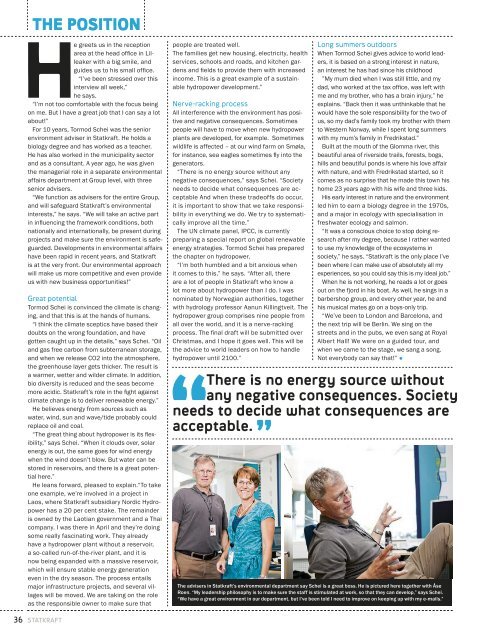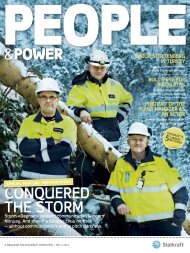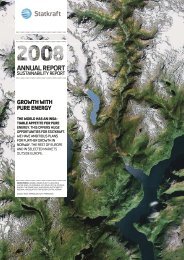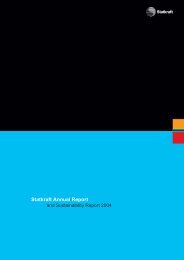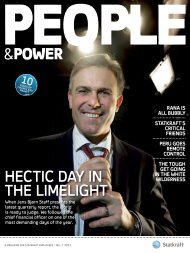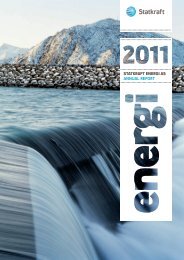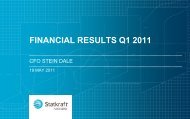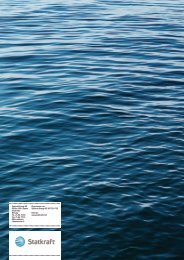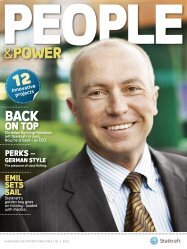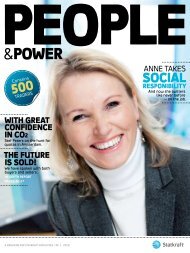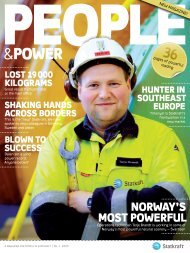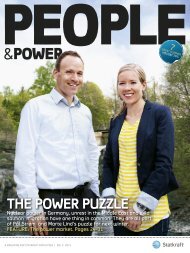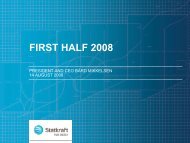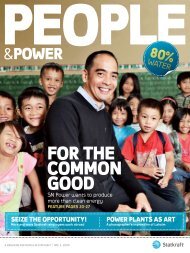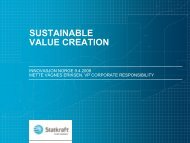No. 3 - 2010 (Download) - Statkraft
No. 3 - 2010 (Download) - Statkraft
No. 3 - 2010 (Download) - Statkraft
Create successful ePaper yourself
Turn your PDF publications into a flip-book with our unique Google optimized e-Paper software.
thePosition<br />
hegreets us in the reception<br />
area at the head office inLilleaker<br />
with abig smile, and<br />
guides ustohis small office.<br />
“I’ve been stressed over this<br />
interview all week,”<br />
he says.<br />
“I’m not too comfortable with the focus being<br />
on me. But I have a great job that I can say a lot<br />
about!”<br />
For 10 years, Tormod Schei was the senior<br />
environment adviser in <strong>Statkraft</strong>. He holds a<br />
biology degree and has worked as a teacher.<br />
He has also worked in the municipality sector<br />
and as a consultant. A year ago, he was given<br />
the managerial role in a separate environmental<br />
affairs department at Group level, with three<br />
senior advisers.<br />
“We function as advisers for the entire Group,<br />
and will safeguard <strong>Statkraft</strong>’s environmental<br />
interests,” he says. “We will take an active part<br />
in influencing the framework conditions, both<br />
nationally and internationally, be present during<br />
projects and make sure the environment is safeguarded.<br />
Developments in environmental affairs<br />
have been rapid in recent years, and <strong>Statkraft</strong><br />
is at the very front. Our environmental approach<br />
will make us more competitive and even provide<br />
us with new business opportunities!”<br />
Greatpotential<br />
Tormod Schei is convinced the climate is changing,<br />
and that this is at the hands of humans.<br />
“I think the climate sceptics have based their<br />
doubts on the wrong foundation, and have<br />
gotten caught up in the details,” says Schei. “Oil<br />
and gas free carbon from subterranean storage,<br />
and when we release CO2 into the atmosphere,<br />
the greenhouse layer gets thicker. The result is<br />
a warmer, wetter and wilder climate. In addition,<br />
bio diversity is reduced and the seas become<br />
more acidic. <strong>Statkraft</strong>’s role in the fight against<br />
climate change is to deliver renewable energy.”<br />
He believes energy from sources such as<br />
water, wind, sun and wave/tide probably could<br />
replace oil and coal.<br />
“The great thing about hydropower is its flexibility,”<br />
says Schei. “When it clouds over, solar<br />
energy is out, the same goes for wind energy<br />
when the wind doesn’t blow. But water can be<br />
stored in reservoirs, and there is a great potential<br />
here.”<br />
He leans forward, pleased to explain.“To take<br />
one example, we’re involved in aproject in<br />
Laos, where <strong>Statkraft</strong> subsidiary <strong>No</strong>rdic Hydropower<br />
has a20per cent stake. The remainder<br />
is owned bythe Laotian government and aThai<br />
company. Iwas there inApril and they’re doing<br />
some really fascinating work. They already<br />
have ahydropower plant without areservoir,<br />
aso-called run-of-the-river plant, and it is<br />
now being expanded with amassive reservoir,<br />
which will ensure stable energy generation<br />
even inthe dry season. The process entails<br />
major infrastructure projects, and several villages<br />
will bemoved. We are taking onthe role<br />
as the responsible owner to make sure that<br />
36 statkraft<br />
people are treated well.<br />
The families get new housing, electricity, health<br />
services, schools and roads, and kitchen gardens<br />
and fields to provide them with increased<br />
income. This isagreat example of asustainable<br />
hydropower development.”<br />
Nerve-racking process<br />
All interference with the environment has positive<br />
and negative consequences. Sometimes<br />
people will have to move when new hydropower<br />
plants are developed, for example. Sometimes<br />
wildlife is affected – at our wind farm on Smøla,<br />
for instance, sea eagles sometimes fly into the<br />
generators.<br />
“There isnoenergy source without any<br />
negative consequences,” says Schei. “Society<br />
needs to decide what consequences are acceptable<br />
And when these tradeoffs do occur,<br />
it is important toshow that we take responsibility<br />
in everything we do. Wetry to systematically<br />
improve all the time.”<br />
The UNclimate panel, IPCC, iscurrently<br />
preparing aspecial report onglobal renewable<br />
energy strategies. Tormod Schei has prepared<br />
the chapter on hydropower.<br />
“I’m both humbled and abit anxious when<br />
it comes tothis,” hesays. “After all, there<br />
are alot of people in <strong>Statkraft</strong> who know a<br />
lot more about hydropower than Ido. Iwas<br />
nominated by<strong>No</strong>rwegian authorities, together<br />
with hydrology professor Aanun Killingtveit. The<br />
hydropower group comprises nine people from<br />
all over the world, and itisanerve-racking<br />
process. The final draft will be submitted over<br />
Christmas, and Ihope itgoes well. This will be<br />
the advice to world leaders onhow to handle<br />
hydropower until 2100.”<br />
long summersoutdoors<br />
WhenTormodSchei givesadvice to worldleaders,<br />
it is based on astronginterestinnature,<br />
an interesthehas hadsince hischildhood<br />
”Mymum died when Iwas still little,and my<br />
dad, who worked at thetax office, wasleftwith<br />
me andmybrother,who hasabrain injury,” he<br />
explains. “Backthen it wasunthinkable that he<br />
wouldhavethe sole responsibility forthe twoof<br />
us,somydad’s family took my brother with them<br />
to Western<strong>No</strong>rway, whileIspent longsummers<br />
with my mum’sfamilyinFredrikstad.”<br />
Builtatthe mouthofthe Glommariver,this<br />
beautifulareaofriversidetrails, forests, bogs,<br />
hillsand beautifulponds is where hislove affair<br />
with nature, andwithFredrikstad started, so it<br />
comesasnosurprisethat he made this town his<br />
home 23 yearsago with hiswifeand threekids.<br />
Hisearly interestinnatureand theenvironment<br />
led him to earn abiology degree inthe 1970s,<br />
and amajor in ecology with specialisation in<br />
freshwater ecology and salmon.<br />
“Itwas aconsciouschoice to stop doing research<br />
after my degree, because Irather wanted<br />
to usemyknowledge of theecosystemsin<br />
society,” he says.“<strong>Statkraft</strong>isthe only place I’ve<br />
beenwhere Ican make useofabsolutelyall my<br />
experiences,soyou couldsay this is my ideal job.”<br />
When he is notworking,hereads alot or goes<br />
outonthe fjord in hisboat. As well,hesingsina<br />
barbershop group, andevery other year,heand<br />
hismusical matesgoonaboys-only trip.<br />
“We’ve been to London and Barcelona, and<br />
the next trip will be Berlin. We sing on the<br />
streets and in the pubs, we even sang at Royal<br />
Albert Hall! Wewere onaguided tour, and<br />
when we came to the stage, we sang a song.<br />
<strong>No</strong>t everybody can say that!” ●<br />
there isnoenergy source without<br />
any negative consequences. society<br />
needs todecide what consequences are<br />
acceptable.<br />
Theadvisers in <strong>Statkraft</strong>’senvironmentaldepartmentsay Schei is agreat boss.Heispictured heretogether withÅse<br />
Roen.“My leadership philosophyistomakesurethe staff is stimulated at work,sothattheycan develop,” says Schei.<br />
“Wehaveagreat environmentinour department, but I’ve been told Ineed to improve on keeping up withmye-mails.”


